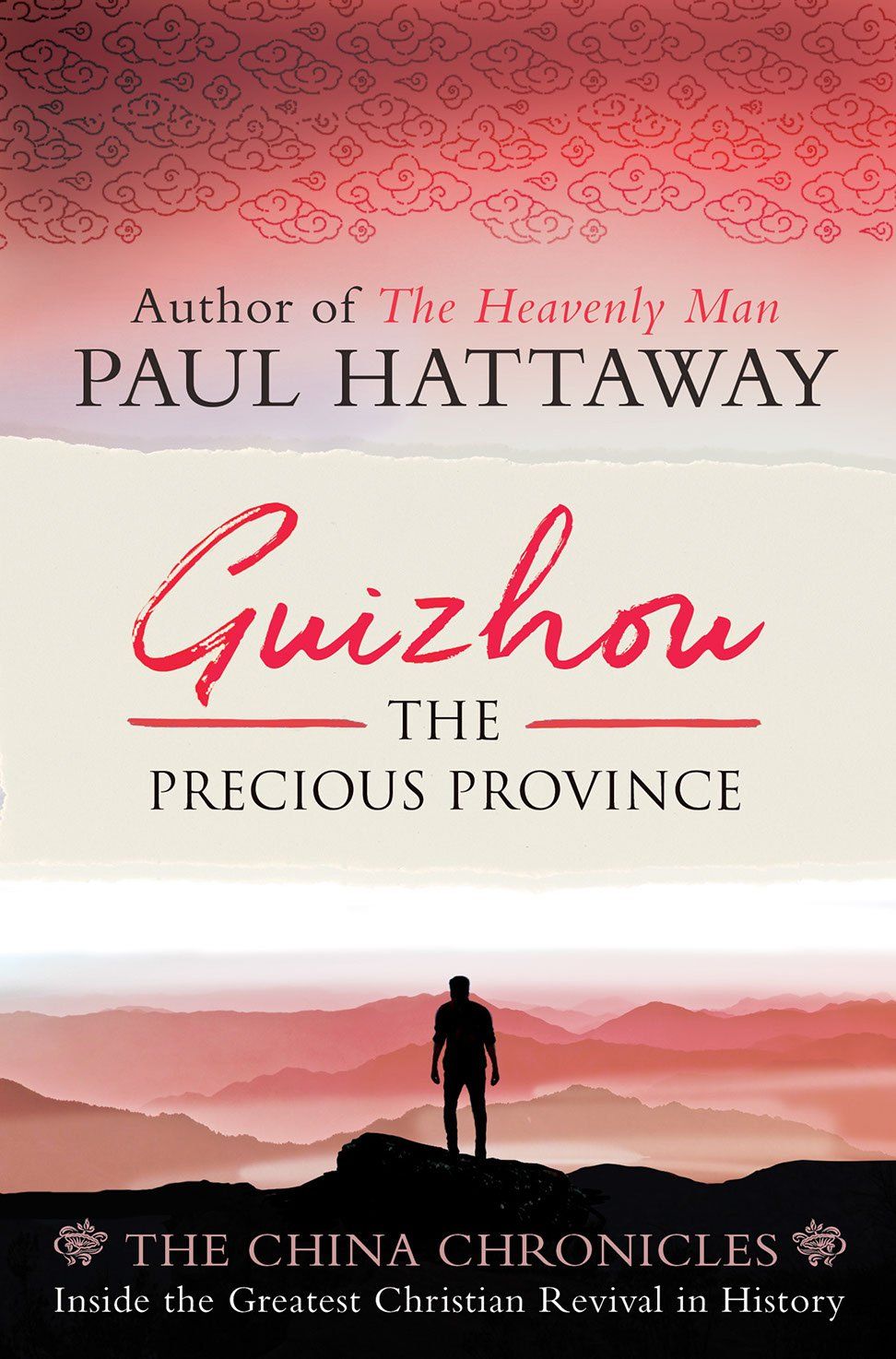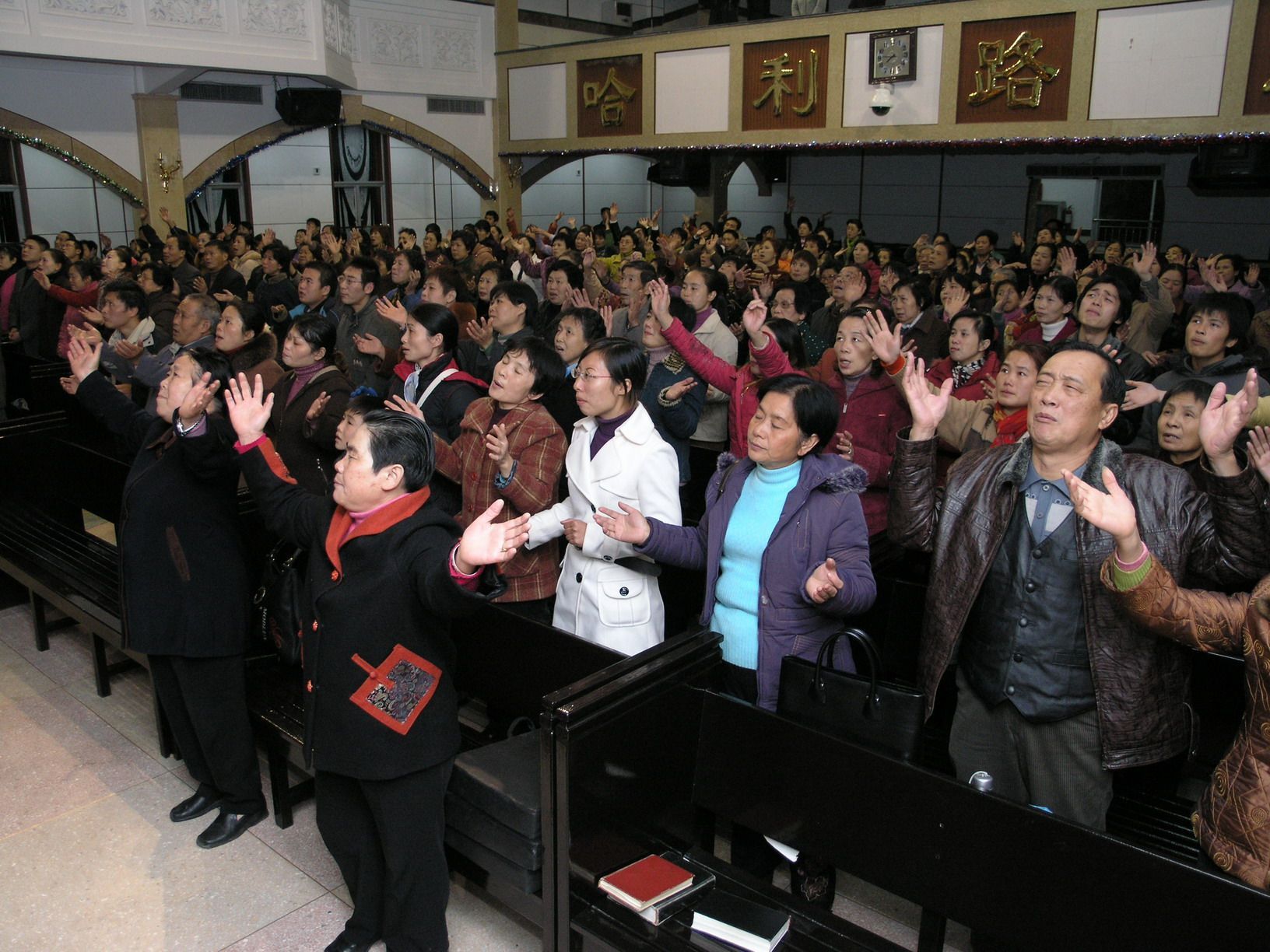1930s
A Breakthrough among the Han
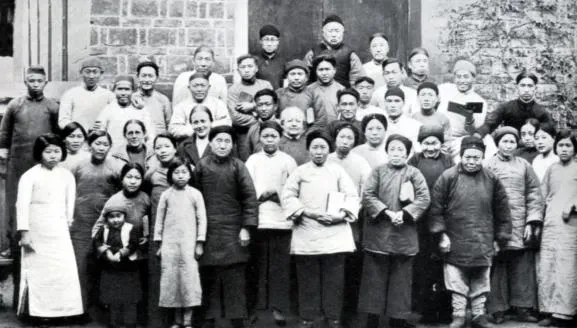
Christians at Bijie in 1938.
While the Christian world had rejoiced at the extraordinary revival among several tribes in Guizhou in the early twentieth century, most people were unaware that the millions of Han Chinese people living throughout the province remained practically untouched by the gospel.
In 1931—more than half a century after Broumton and Judd first arrived in Guizhou—there were still entire counties that had never been visited by a missionary and where Jesus had yet to be named.
Unexpectedly, in 1931 a breakthrough of God's grace and power occurred among the Han Chinese at Dushan in southern Guizhou—the same town where 2,000 families had prematurely expressed an interest in becoming Christians at the start of the century. The vessel chosen by the Holy Spirit to bring His blessing was a local pastor named Fang.
Over the Chinese New Year period a series of evangelistic meetings was held at Dushan. For three days the weather was fine and sunny (a rare occurrence in Guizhou), and between 150 and 200 people attended the meetings from throughout the area. Many people surrendered their lives to Christ, and a missionary said of Pastor Fang: "I had almost despaired of seeing such a man in this province. He has been a Christian for 40 years and has gone on with the Lord. Although he has been through much trouble, he is such a happy man. He keeps true to the Scriptures."
Fruit at Weng'an
Harry Taylor of the CIM had been based at Guiyang since 1927. Work in the provincial capital had proven difficult, with few people showing any interest in the message of eternal life. Taylor was encouraged by news of the breakthrough at Dushan, and decided to visit the nearby Weng'an area to see if there would be a similar response to the gospel. After traveling to the south of the province with a Chinese co-worker and a large supply of Christian literature, Taylor was shocked to find a spiritual hunger among the people like he had never seen in Guiyang. He shared:
"As it was market day when we arrived we soon had a crowd of interested people besieging us. The evangelist was preaching and selling gospels at the front door of an inn during the afternoon, and I had a good time preaching to the crowd of about 200 that listened very attentively....
Afterward we learned that an old sorcerer over 60 years of age heard us that day and believed. He came in more than once to ask about the gospel and said he realized that he would have to start a new life and give up his sins....
After about eight days we began to see fruit, and a shopkeeper, whose business was to sell paper connected with idolatry, came to see me and said that he wanted to believe. I explained the way of salvation, and got him on his knees praying and confessing his sins. So we did with all who claimed to be real. This man was willing to burn his stock of paper, with the idol on the top of it. His action and subsequent witness made a profound impression on the city.
Then came another who had a small stall on the street and he also took a definite stand. These two made a practice of coming each evening for Bible study and prayer. Then they brought others who were interested and we dealt with them."
Finally, after many generations of people had gone into a Christless eternity without hearing the gospel, this one visit resulted in the formation of the first Evangelical church in the history of Weng'an. Several months later it was reported, "Altogether we have the names of almost 20 men and women who were dealt with at Weng'an, and many more are interested. At the beginning we prayed that as a result of our visit there should be a church in the city when we left. God has answered."
Most of the missionaries up to that point believed that the most effective strategy was to reach the largest cities first, and that the gospel would automatically radiate out to other districts. The problem was that the churches in Guiyang had never been beacons of light, but were filled with many problems and weaknesses. Buoyed by the success of his trip to Weng'an, Taylor encouraged other missionaries in the capital to also visit outlying districts, and the fame of Jesus gradually spread to many parts of the province for the first time.
The Tide Turns in Guizhou
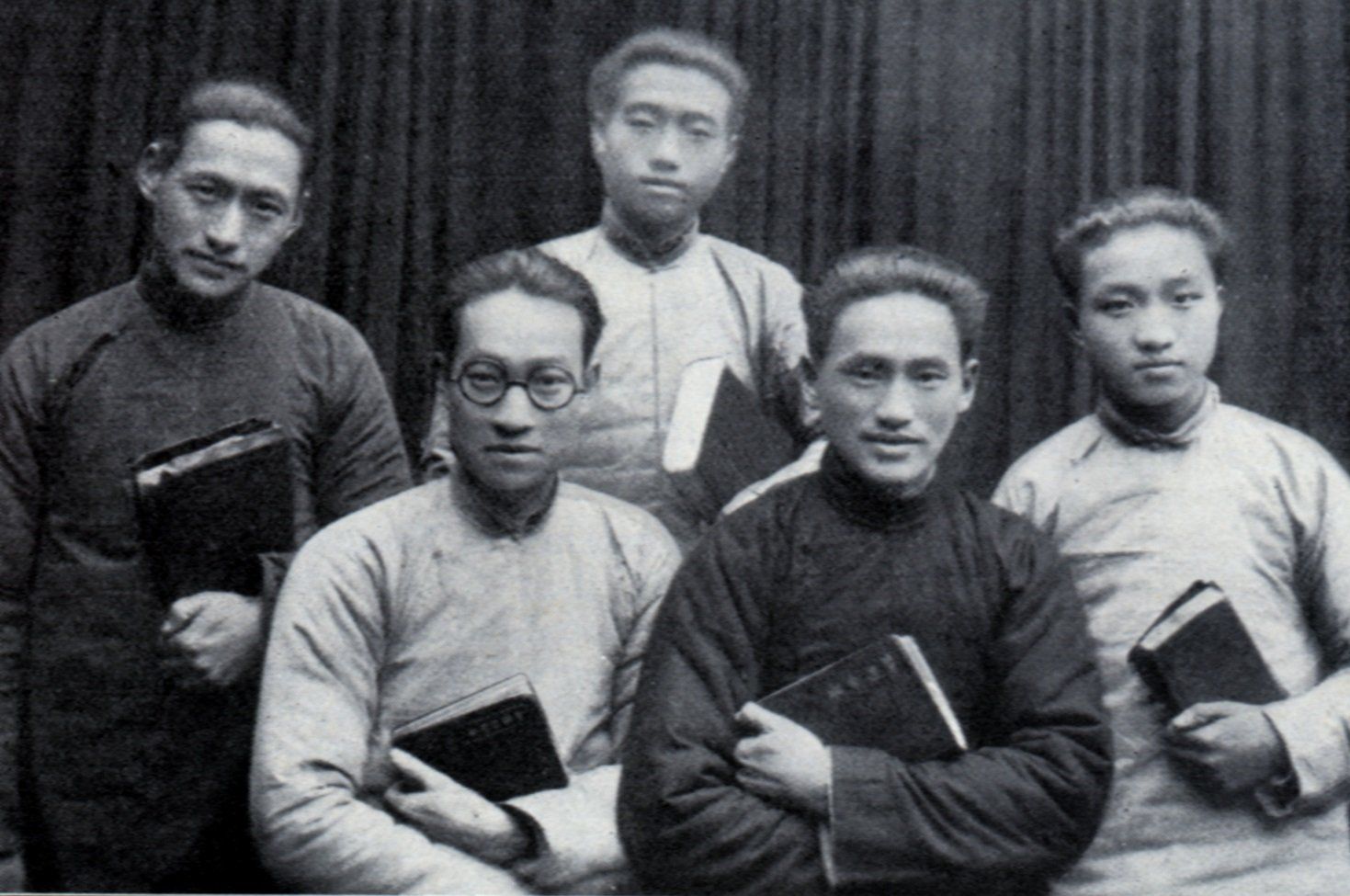
This multi-ethnic band of evangelists toured Guizhou in the mid-1930s. The members included two Han, two Miao, and one Nosu preacher.
The 1930s saw strong Christian growth in many parts of China, as the Holy Spirit visited His people with great power. Revival came to many churches, but remote Guizhou Province remained largely unaffected, until the Bethel Band Mission visited the Anshun area in 1934. Before the meetings commenced, six weeks of fervent intercession took place. Consequently, when the preaching got underway,
"A startling movement began, one in which the confession of awful sins preceded the revival of believers and the salvation of non-Christian tribespeople. Late in 1935, the revival was continuing among the Miao tribes and a profound work of grace was going on at Anshun. The revived Christians formed many preaching bands which went everywhere preaching the Word....
More than six months later, the missionaries were still telling of prayer meetings going on till midnight, with a deep sense of conviction followed by a manifestation of confession and crying for forgiveness."
The effect of the ministry by the Bethel Bands was far-reaching. Many of the foreign missionaries in Guizhou had labored for years with little success, and the fresh wave of the Holy Spirit was like rain to a parched and thirsty land. Missionary Eugene Crapuchettes attended the meetings in Anshun and was deeply touched. He reported:
"The Spirit worked mightily and there was loud crying and seeking acceptance with God.... A young fellow cried out for his relatives, being greatly pressed in the Spirit, fearing lest they fall into hell. He later went to them and pleaded with them to come to the meeting, but only received rebuffs. He could not contain himself and cried before them. Strangely enough, they were building a house and two of the largest beams broke in the middle—no one knows how—and the combination of circumstances induced them to go. They were blessed, too."
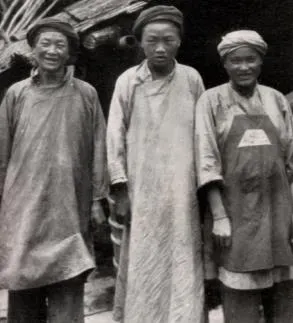
A Christian family at Zunyi in 1933.
In Zunyi—a strategic town whose name means 'to observe righteousness'—missionary Charles Chapman had labored for several years with little outward sign of progress until the revival touched the believers there. Chapman testified:
"I have been itinerating with the Evangelistic Band for some eight weeks, during which many hundreds of tracts were scattered, gospel portions and New Testaments sold and posters used. The Lord was with us and we have had much joy in the proclamation of His Word. Indeed, I have never had such a time with the Chinese brethren before.
Praise God, we believe that the tide had turned for blessing in Guizhou—there is a different spirit abroad, in the Church, among the workers, in witnessing on the street. Everything seems different. Much more prayer is being made by the Chinese themselves, and we are hoping and praying that this year's Bible school will result in a mighty strengthening of those whom we believe the Lord will use in the reviving of His work."
The Spirit of God searched people's hearts at a village called Bei Madong, and many were placed under intense conviction, causing them to cry out to Jesus Christ for relief. As a result, a missionary wrote:
"Confession of most awful sins took place, many times in the presence of those who had been offended. What greatly rejoiced my heart was to see a Hmong Shua (a most numerous tribe and very difficult to reach, and among whom are only a few cold Christians) break down in a most pitiable condition. I thought his heart would break as he confessed most terrible sins and it was some time before he received peace.
Many of these people were cold and unyielding until the break came, but afterwards were as humble and gentle as children. A notable case was a young man whose brother was first blessed. He insisted he had no sin and was perfectly all right, but in one of the meetings, although it was a freezing cold day, his face was running with perspiration, and he looked as though someone had thrust a dagger into his heart. Later he received joy."
The impact of the visitation of God's Spirit among the Guizhou churches in 1934 and 1935 was immediate and powerful. A new sense of unity and love was manifested between believers who had previously been cold toward one another. Many Christian students were revived and transformed, and the Guizhou Bible School received an influx of new students eager to study God's Word in preparation for service.
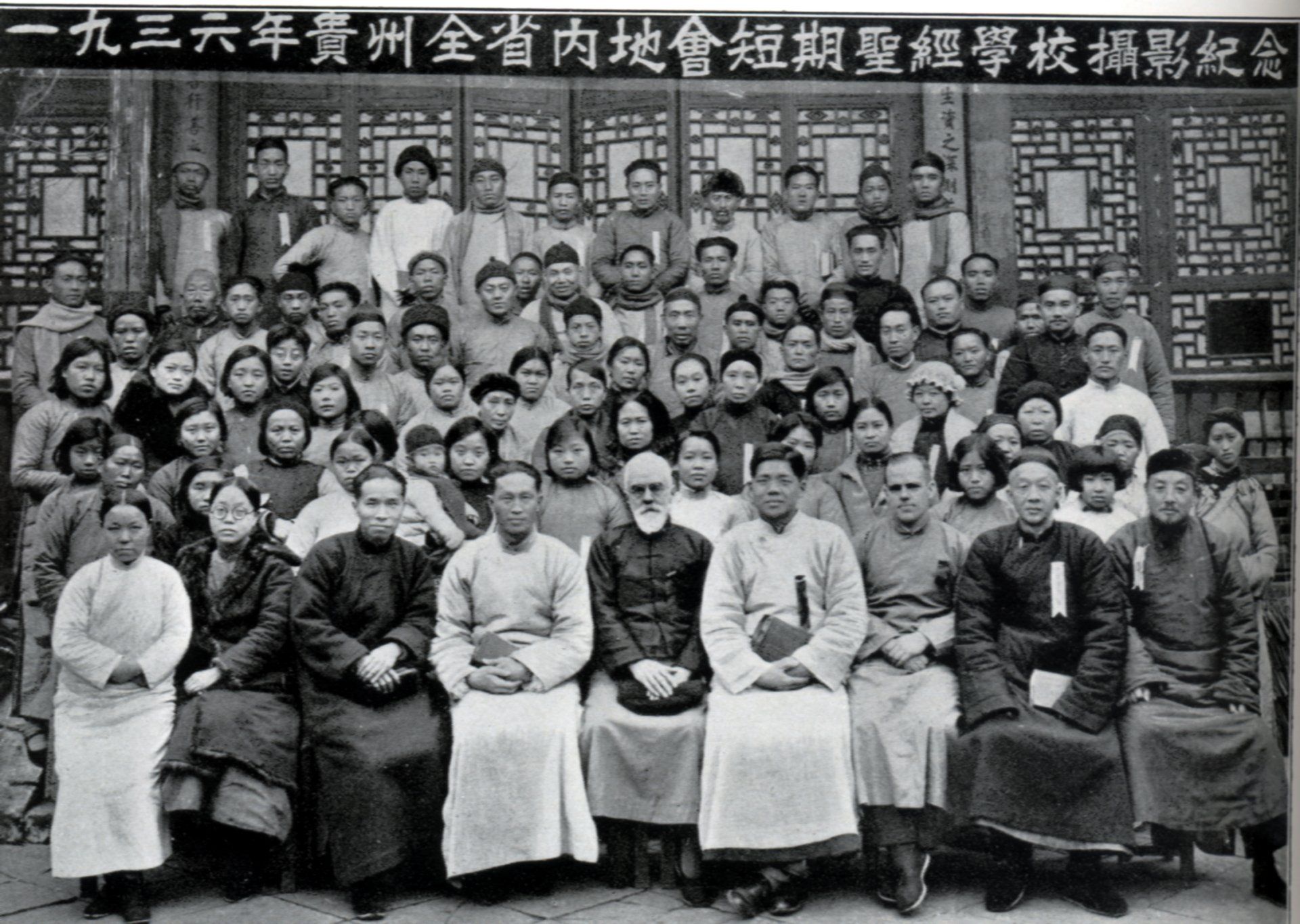
The students and faculty of the Guizhou Bible School in 1936.
The Ge

A Ge girl in traditional dress. [Paul Hattaway]
The Ge are one of dozens of distinct people groups inhabiting the hills of eastern Guizhou. Numbering more than 130,000 people today, the Ge have been included in the huge and diverse Miao nationality by the Chinese government, but they consider themselves distinct from the Miao and they proudly possess their own history, customs and language.
After the energetic Australian missionary Maurice Hutton completed his translation of the Hmu New Testament in 1934, his focus shifted to the nearby Ge tribe. The following year he remarked:
"The best and most cheering news of all to us is that one of the newly baptized believers is a Ge tribesman. It reminds me of the nine years of prayer and work to get an entrance into that tribe and the one soul—now there are six men and I hear their wives and families are interested in the gospel too.... The Lord has been burdening my heart for these Ge tribespeople without any portion of God's Word in their language."
In 1937 Hutton reported that "Several Ge families have believed and we are at present having the Gospels of Mark and John and a catechism and some hymns and choruses printed, for we have also reduced their language to writing for them."
Hutton used the same phonetic script to translate the Ge Scriptures as he had done with the Hmu New Testament. Although the Ge books were printed, no evidence exists that they were ever sent to the area or distributed among the Ge.
Tragically, in the early 1950s it appears the Ge Christians gave up their faith when the missionaries were expelled from China. One observer bluntly noted, "They believed in the missionaries and not in Jesus."
Several decades passed before a small Ge church once again emerged in the 1990s. Today there are believed to be only about 100 believers among this little-known tribe.
560 Days in Captivity

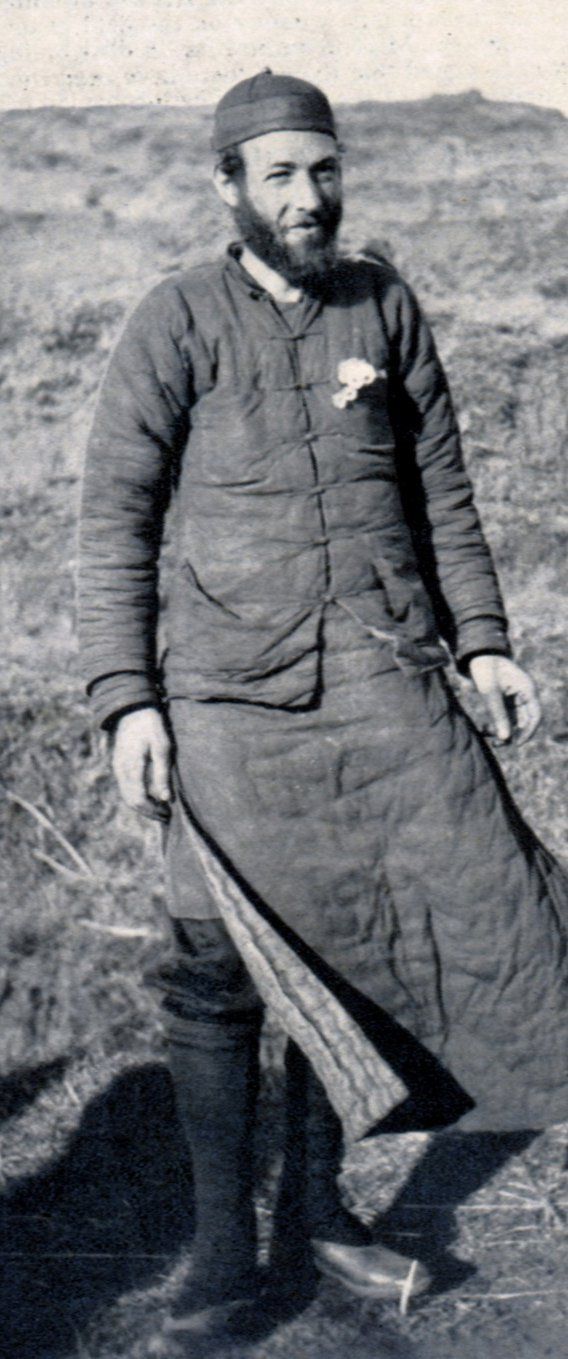
Rudolf Bosshardt before being taken hostage (left); and after his release 80 weeks later (right).
The Guizhou town of Zunyi is revered in China for being the first major stop during the famous Long March of the Communist army. They commenced their epic journey with 85,000 men and women, but by the time they entered Zunyi a few months later they only had 30,000 troops left. A special meeting was held in the town, at which Mao Zedong emerged as the new leader of the Chinese Communist Party and the commander of the Red Army.
The lives of two CIM workers were dramatically altered by the Long March. On October 1, 1934, Rudolf Bosshardt, from Switzerland, and New Zealander Arnolis Hayman were captured by the Sixth Red Army near Jiuzhou in the Hmu tribal area. The missionaries thought they would be quickly released, but on December 24 they were put on trial by the Communists after a failed attempt to escape. Among the charges levelled against the pair were:
"The two prisoners by means of the Bible drugged the masses and brought them under their control.... The said prisoners have learnt the Miao language and have deeply entered into the caves of these people. In Jiuzhou of those who have been deceived and joined the Church, 90 percent are of the Miao tribe."
The men were told they were deserving of death, but instead, they were moved around the countryside by the Communists as ransom demands were made to their families and the mission. For many months the wives of the two hostages endured an emotional rollercoaster, as false reports of their deaths were received. The ransom demands started at $100,000 each, but when payment was not forthcoming the amounts increased.
Meanwhile, news of the kidnapped missionaries spread throughout the Christian world, and thousands of believers were interceding for the men and their heartbroken families.
As their captors' patience began to wear thin, Bosshardt and Hayman were beaten with bamboo canes. For months they were forced to march across mountains and through remote areas of four different provinces. The dire conditions took a heavy toll on the men, who were often accompanied by other hostages, including a French Catholic priest.
Some of the Chinese hostages whose families were unable to pay the ransom were executed by the cruel and heartless Communists. One poor woman, who was unable to keep up, was unanimously voted to be killed. Bosshardt recalled that the executioner was a young man about 20 years-old, who "borrowed a sharp sword and dragged her away, followed by a second comrade carrying a hoe. Soon they returned smiling, and as indifferent as though they had done nothing more than kill a chicken for dinner."
The CIM, meanwhile, had raised funds in a bid to pay the ransom, but communicating with the Communists proved difficult, as they were constantly on the move. When money was finally handed over, the Communist judge sneered at the men and deceitfully told them that only half of the payment had been met, so they could only release one of the men. Because he was older, Hayman was released and allowed to return to his family after 413 days in captivity.
Now alone with the Red Army, Bosshardt did all he could to focus on the Lord Jesus Christ, and he continued to share his faith with the soldiers. On one occasion he was surprised when the General tried to mock Bosshardt by telling the company, "He believes the Lord Jesus shall come a second time and call the faithful to Himself. When this happens and all the good people are gone, then the Communists will be able to put through their program."
Many more months went by, as the soldiers and their prey doubled back by marching hundreds of miles through mud and leech-infested regions of Guizhou, until they passed into Yunnan Province. The Nationalist Army was stronger in Yunnan, and the Communists decided to abandon the missionary and move on without him. Ironically, one of the most dangerous moments in the entire ordeal came after Bosshardt was released. Clothed in filthy rags and with a long unkempt beard, the Nationalist soldiers believed he was a Russian Communist spy and were preparing to kill him when they discovered his true identity.
On Easter Monday, 1936, Bosshardt was placed on a horse and rode the last stage into Kunming. As he approached the city, three missionaries rode toward him. When they saw it was their missing colleague, the men burst into singing the doxology. One of them said:
"He looked so pale, ill and emaciated, but he was so cheerful.... He was too weak even to ride a horse. His legs were swollen, and he had been wearing the clothes he had on for four months without having changed once.... His hair and beard badly needed the barber's attention. The joy of holding his hand and welcoming him back among us will not soon be forgotten....
Bosshardt was brought in a rickshaw to the home of a missionary, where a warm bath, clean clothes and bed awaited him. A bonfire disposed of the Chinese clothes he had been wearing, and all accumulated attachments. The sensation of being clean, comfortable and shaven for the first time in many weary months can only be fully appreciated by those who have had a like experience."
After such a long and harrowing ordeal, God's hand continued to be upon Bosshardt and Hayman, and the difficult experience didn't appear to impact their lives negatively.
Arnolis Hayman lived a full life until his death at Sydney, Australia, at the age of 81, while Rudolf Bosshardt shocked many by returning to serve God in Guizhou until he and his wife Rose were expelled by the Communists in 1951.
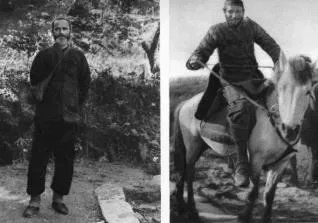
The first pictures of Hayman (left) and Bosshardt (right) after 413 and 560 days in captivity.
© This article is an extract from Paul Hattaway's book 'Guizhou: The Precious Province'. You can order this or any of The China Chronicles books and e-books from our online bookstore.

